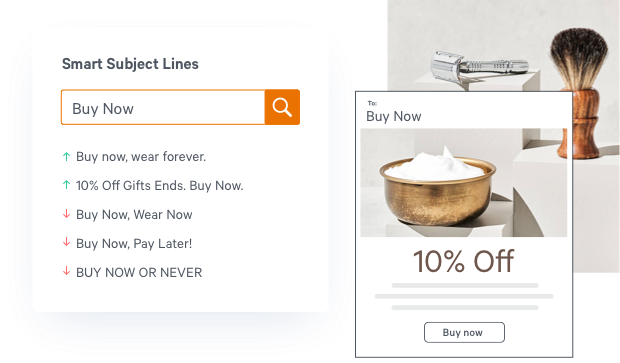As a small business owner, you’re the CEO, Chief Marketing Officer, Chief Financial Officer, Customer Service Rep, everything all at once. You have multiple balls in the air and are switching roles at any given time. You always have one eye on growing your online sales, but you might find it tough to stay on top of best practices in marketing due to competing priorities.
The truth is, marketing has changed a lot in recent years. With more people making online purchases (and boatloads of customer data being collected), marketing has become very data-driven. More and more of our customers who sell online (and have more than 2,500 email subscribers) are moving to our Ecommerce Pro plan because it supports this relatively new way of marketing.
Data-driven marketing might sound a little intimidating and time-consuming, but with the right approach, it’s actually totally accessible, even for novice marketers. Below, I’ll explain what data-driven marketing is, and how it can make your life easier and your small business more successful.
What is data-driven marketing?
Ok, I’ll admit, the term “data-driven marketing” sounds vague and complicated but it really boils down to using customer data to better engage with your customers and improve the effectiveness of your marketing.
Think about all the data that is collected when you shop online:
- Which email brought you to the site to make the purchase?
- At what time of day did you read and take action on the email?
- What did you purchase?
- Are you a first-time or repeat customer?
- Did you take advantage of a sale or pay full price?
- What other products did you browse?
This is just the tip of the iceberg in terms of the many types of customer data that are collected and stored.
The highest-performing marketing platforms can use all this data and knowledge to connect with your customers and keep them interested in the brand. Think about it — which types of email messages are you happy to receive? They are likely ones that provide you with interesting, helpful, or entertaining content, tailored to your preferences.
Those great email messages are no accident. They’re possible due to data-driven marketing. A sneaker brand might know that you typically purchase twice a year, and opt for bright colors. Wouldn’t it make sense, then, to skip the weekly promo blast emails (that could annoy you and drive you to unsubscribe) and send fewer messages, featuring sneakers in bright colors?
Data-driven marketing is easier than it sounds
Do you think you need to be an analytical wiz to get started with data-driven marketing? You don’t, because technology allows you to collect, organize and make sense of all of your data. For example, small business owners who opt for our Ecommerce Pro plan benefit from the built-in customer data platform (or CDP).
This CDP pulls in the data from your various marketing tools and ecommerce platforms (e.g. Shopify, Magento, BigCommerce) and gives you a clear picture of every customer, and when and how you should market to them. You can learn so much about your customers and their buying habits and interests, and that knowledge allows you to be much better at marketing to them.
Could you dig in further and learn more about data-driven marketing if you wanted to? Of course you could. Our team of ecommerce experts and data scientists (the ones who built the technology powering the Ecommerce Pro plan) could explain why your customers are being segmented the way they are, and why certain products are being recommended to certain customers.
They could explain things like the smart subject lines feature, a nifty little tool that uses data from the millions of emails we send every month to show you which ones are predicted to perform better (indicated with a green up arrow) or worse (indicated with a red down arrow). Why is this so useful? Subject line effectiveness is closely linked with email open rates, which are linked to revenue.
Smart Subject Lines helps you make a data-informed decision on the best subject line to use to maximize your email open rate.
New Ecommerce Pro plan customers also find the ecommerce playbooks helpful, because they are a preconfigured, “out of the box” feature that gets you up and running immediately with data-driven marketing. The playbooks use your customer data to ensure your emails get to the right prospects or customers no matter where they are in their buying journey.
Data-driven marketing is the key to keeping your customers
I alluded to this earlier, but one of the biggest reasons for writing this article is to underscore how important data-driven marketing is for keeping your customers. If you use your customer data to deliver personalized messages to your customers, they will be more likely to engage with your brand, make repeat purchases, and remain loyal.
So do you need a degree in data science to be successful with data-driven marketing? Absolutely not. You just need to continue doing what you’ve always done, keeping your eye on the ball and adapting in order to stay competitive.
